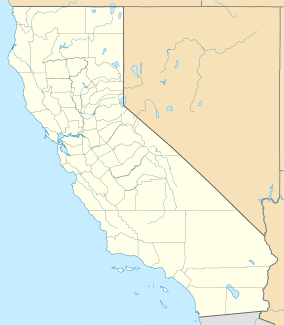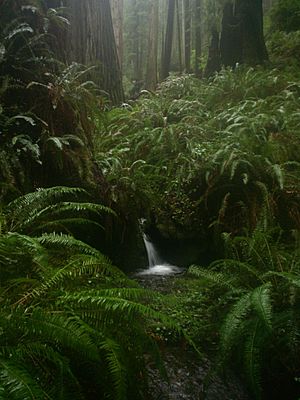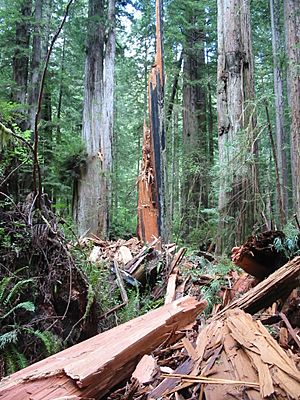Prairie Creek Redwoods State Park facts for kids
Quick facts for kids Prairie Creek Redwoods State Park |
|
|---|---|
|
IUCN Category II (National Park)
|
|
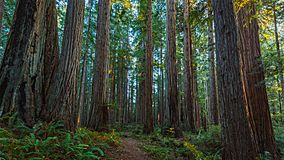 |
|
| Location | Humboldt County, California, USA |
| Nearest city | Arcata |
| Area | 14,000 acres (57 km2) |
| Established | 1925 |
| Governing body | California Department of Parks and Recreation (cooperatively managed within Redwood National and State Parks) |
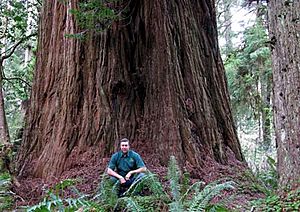
Prairie Creek Redwoods State Park is a special state park in Humboldt County, California. It's located near the town of Orick, about 50 miles (80 km) north of Eureka. This amazing park covers about 14,000 acres (57 km²) and is a safe home for very old Coast Redwood trees.
The park is managed by both the California Department of Parks and Recreation and the National Park Service. It's part of the larger Redwood National and State Parks system. These parks, which also include Del Norte Coast Redwoods State Park and Jedediah Smith Redwoods State Park, are so important that they are a World Heritage Site. They are also part of a special area called the California Coast Ranges International Biosphere Reserve.
One of the most famous spots in the park is the open grassy area along the Newton B. Drury Scenic Parkway. Here, you can often see Roosevelt elk grazing. These open grasslands within the redwood forest are called "prairies." The park gets its name from Prairie Creek, which flows near this meadow. Other popular places to visit are Fern Canyon and Gold Bluffs Beach. The park is also home to unique animals like the tailed frog and different kinds of salmon.
Contents
Discovering the Park's Past
The Yurok people lived in the area that is now Prairie Creek Redwoods State Park for a very long time. They traditionally lived near the Klamath River and along the Pacific Ocean coastline. The Yurok had many villages, at least fifty in total, stretching from Little River in the south to the Wilson Creek Basin in the north.
Some of the first European-Americans arrived in 1851. They came because gold was discovered in a place called Gold Bluffs. Gold Bluffs was once a busy mining camp, but not much of it remains today.
After the Civil War ended and gold prices dropped, the mining operations at Gold Bluffs slowed down. There's a story about a tunnel built in 1898 by miners from Cornwall. This tunnel was 600 feet long and six feet square. It was built to bring water from Prairie Creek to another creek. This tunnel was used for five years. By 1920, all mining in the Gold Bluffs area had stopped.
The park itself was created in 1923. It started with a gift of 160 acres from Zipporah Russ to the Save the Redwoods League. By 1931, the League had bought another 5000 acres from a large timber company. During the Great Depression, a group called the Civilian Conservation Corps helped improve the park. They cleared campsites and built fences around the prairie areas.
Amazing Giant Trees
Prairie Creek Redwoods State Park is famous for its incredible trees. Some of the most well-known redwoods include Big Tree, Corkscrew Redwood, and the Cathedral Trees. Many of the redwoods in the park are over 300 feet (91 meters) tall!
Besides the giant Coast Redwoods, you can also find other tall coniferous trees in the park's forests. These include coast Douglas fir, Sitka spruce, and western hemlock.
Exploring the Trails
The park has many trails for hiking and exploring. Here are some of the popular ones:
- Miners Ridge and James Irvine - 11.6 miles (18.7 km)
- Brown Creek Loop - 3.5 miles (5.6 km)
- Big Tree Loop - 3.2 miles (5.1 km)
- Ten Taypo Trail - 3.5 miles (5.6 km)
- Rhododendron and Cal Barrel - 5.1 miles (8.2 km)
- West Ridge and Prairie Creek South - 5.8 miles (9.3 km)
- West Ridge and Rhododendron North - 7.7 miles (12.4 km)
- The Friendship Ridge Trail - 8.0 miles (12.9 km)
- The Ah Pah Trail - 0.6-mile (0.97 km)
- The Nature Trail - 1.0-mile (1.6 km)
Park Facilities
The park has a visitor center with interesting displays, maps, and a bookstore. It's located near the campground. There's also parking available along the parkway, where you might spot elk. You don't need to pay a fee to park in these areas during the day.
Restrooms are available near the visitor center and also at the Big Tree parking lot.
See also
 In Spanish: Parque estatal de Prairie Creek para niños
In Spanish: Parque estatal de Prairie Creek para niños
 | Stephanie Wilson |
 | Charles Bolden |
 | Ronald McNair |
 | Frederick D. Gregory |


